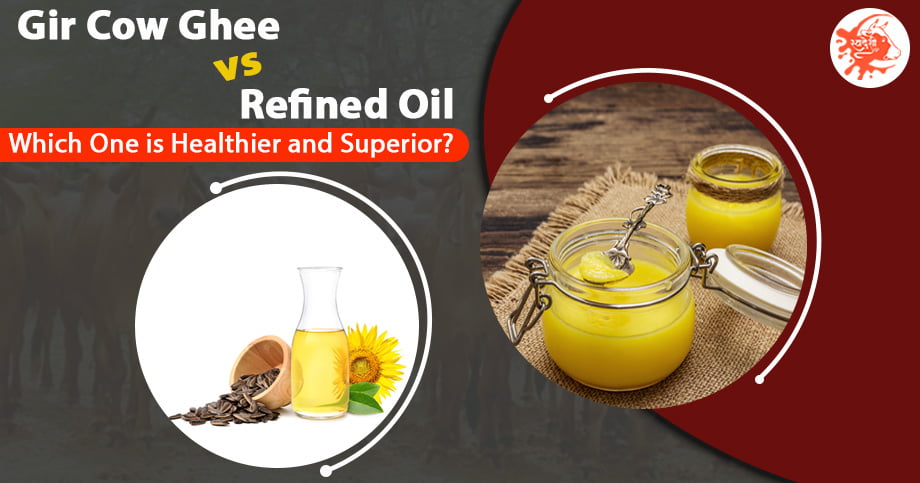
Recent studies have discussed the nutritional benefits of substituting desi cow Ghee for all the vegetable oils we now use. It has resulted in two queries, i.e., gir cow ghee vs refined oil: Which one is the ultimate choice and what are the health advantages of using desi A2 ghee? We are well aware of the wonderful advantages of eating organic A2 Gir cow grass-fed ghee. This write-up will briefly teach you about Gir cow ghee and refined oil and the healthier and superior option- Gir cow ghee vs refined oil.
All of us utilise refined oils and ghee in our daily lives. When it comes to cooking vegetables, preparing anything else, or spreading them on parathas or roti, both are thought to be ideal for cooking. But there are numerous differences between refined oil and ghee. Since Desi ghee is healthier for cooking, some people believe it to be healthier than refined oil. However, some people, including some medical professionals, believe that refined oil remains superior to desi ghee. Choosing which is superior can be difficult, but understanding the aspects pertaining to Gir cow ghee vs refined oil makes it easier. Therefore, we’re here to assist you. We will talk about which is best- Gir cow ghee vs refined oil. You can choose which one to get based on their similarities, distinctions, and advantages. Hence, you’ll use them wisely when preparing various foods once you understand the distinction between the two.
Gir cow ghee has always been a staple of Indian cuisine from the beginning of history. The word “ghee” in Sanskrit means to sprinkle. It is a type of clarified butter with a higher concentration of fat than butter. In comparison to ghee, butter contains more water and milk solids than ghee does. It was produced in ancient times as an alternative to butter because butter begins to spoil more quickly. Ghee can indeed be kept at room temperature for longer periods. In Ayurveda, ghee is known as “ghrita”. It serves as a cure for a wide range of ailments.
The oil that has been purified is referred to as refined oil. It is not, however, truly “pure” oil. Hazardous substances like nickel are used in the purifying process. It is treated with alkali, acid, or bleaching. After that, it is either filtered, neutralised, or deodorised. Hydrocarbon Hexane is also necessary for these procedures. In addition to sodium hydroxide, it also contains several hazardous preservatives. Deodorization is necessary because it makes the oil go stale and generates PUFAs, or polyunsaturated. Whenever the oil is extracted from the seeds, Trans fats are produced.
Here are some of the refined oils that are most often used today:

I hope you’ve understood all the aspects pertaining to gir cow vs refined oil. Gir cow ghee is a common ingredient in many Indian dishes, whether it is spread on sizzling hot chapattis or drizzled on top of the curry. Today’s fitness enthusiasts, however, have started consuming less ghee and switching to refined oils, which are bad for their health. When discussing the key differences between Gir cow ghee and refined oil or debating which is superior, no matter what type of oil it is—refined, cold-pressed, or wood-pressed—Gir cow ghee is healthier and superior as it is renowned for offering energy, strength, and vitality to enhance physical wellness.
Gir Cow Ghee is better for you than processed oils. It is unadulterated and has every nutrient the body needs to remain healthy. Therefore, you must substitute Gir Cow Ghee for refined oils in your daily dietary requirements. The preferred choice if you’re seeking a reliable brand, is SwadeshiVIP. The good fats in SwadeshiVIP A2 Ghee support cardiovascular health while also preventing the accumulation of extra fat. Order now via the website or download the app.
Read our Article: Natural Texture of Ghee & Science behind Granulation
